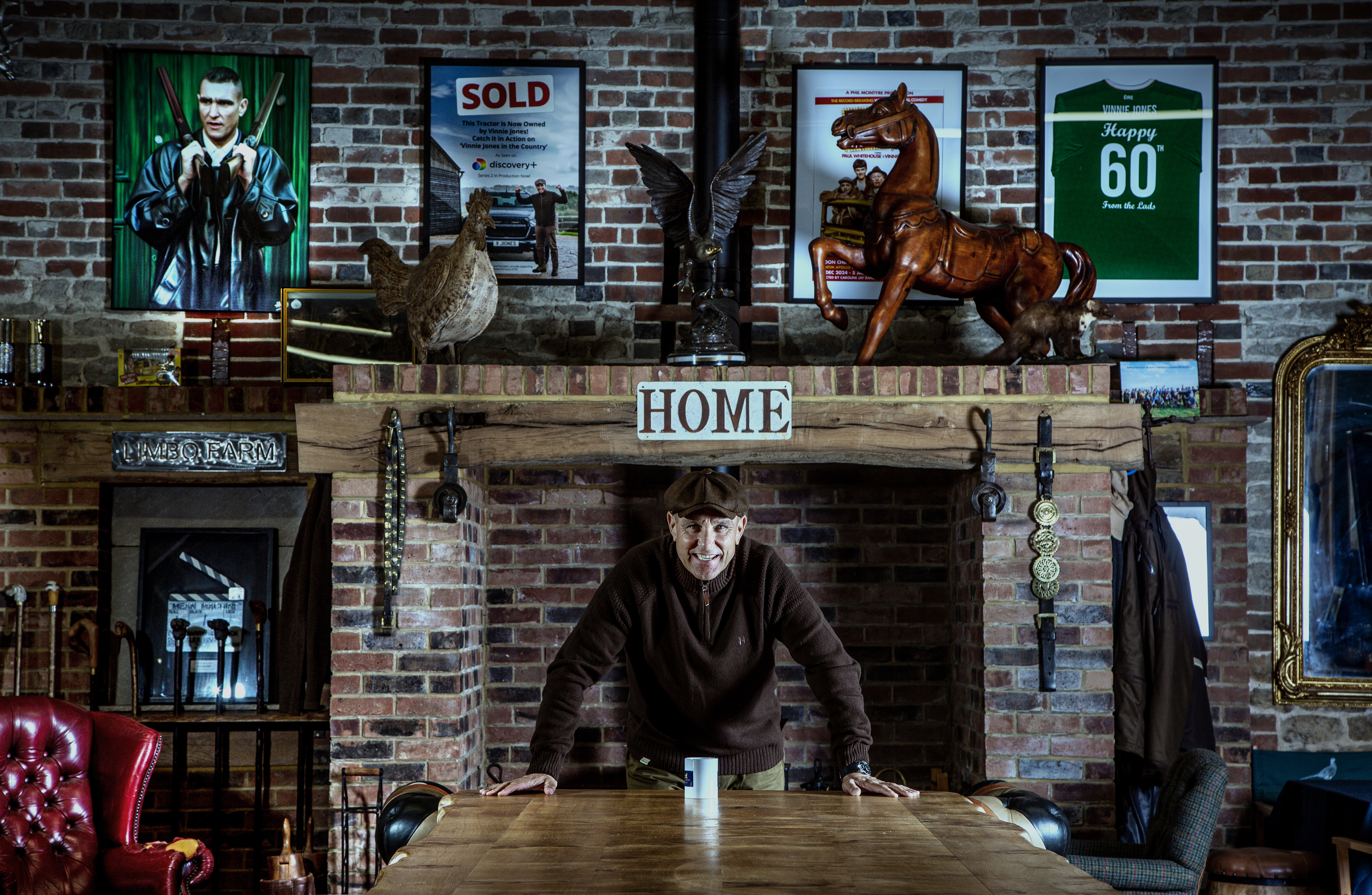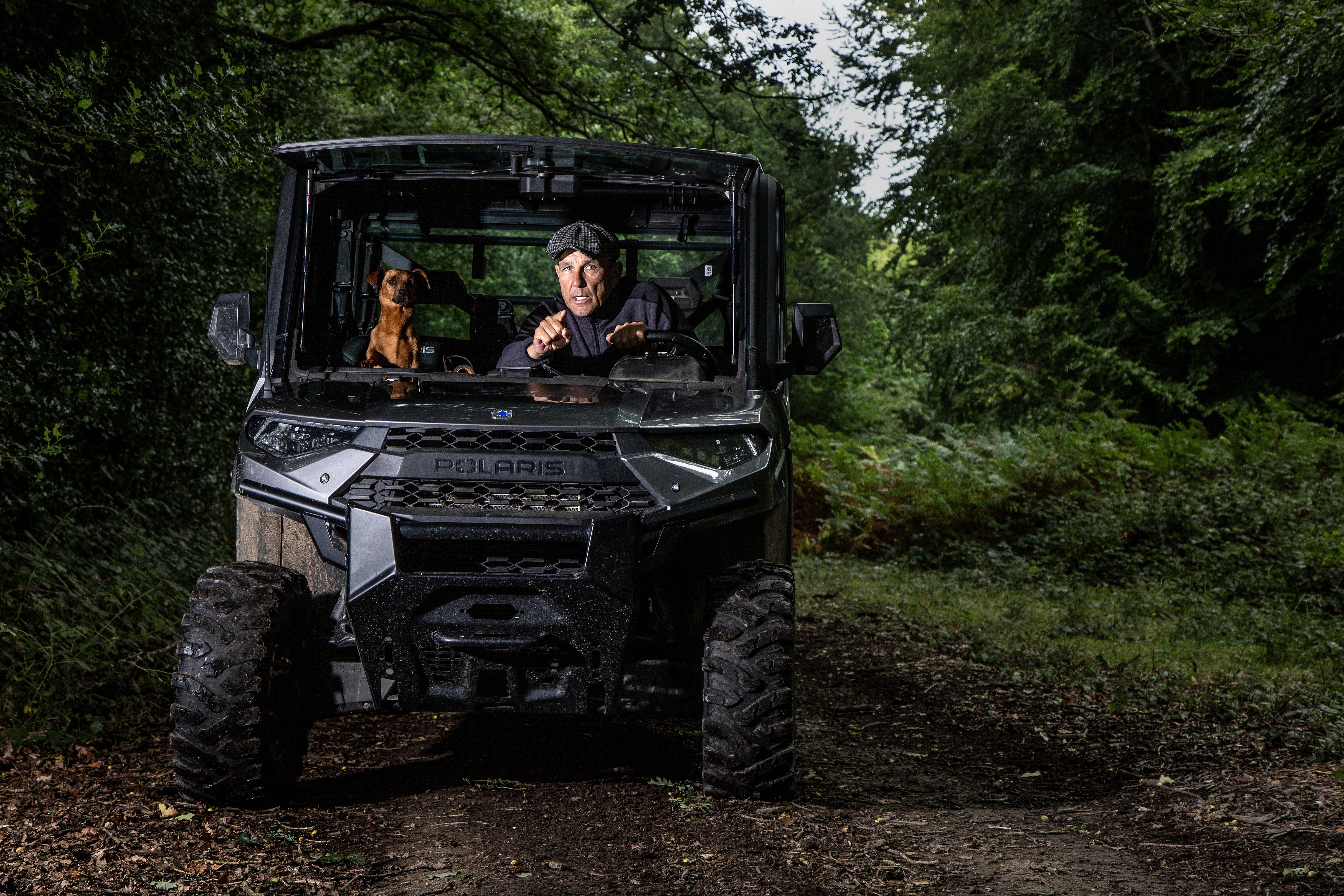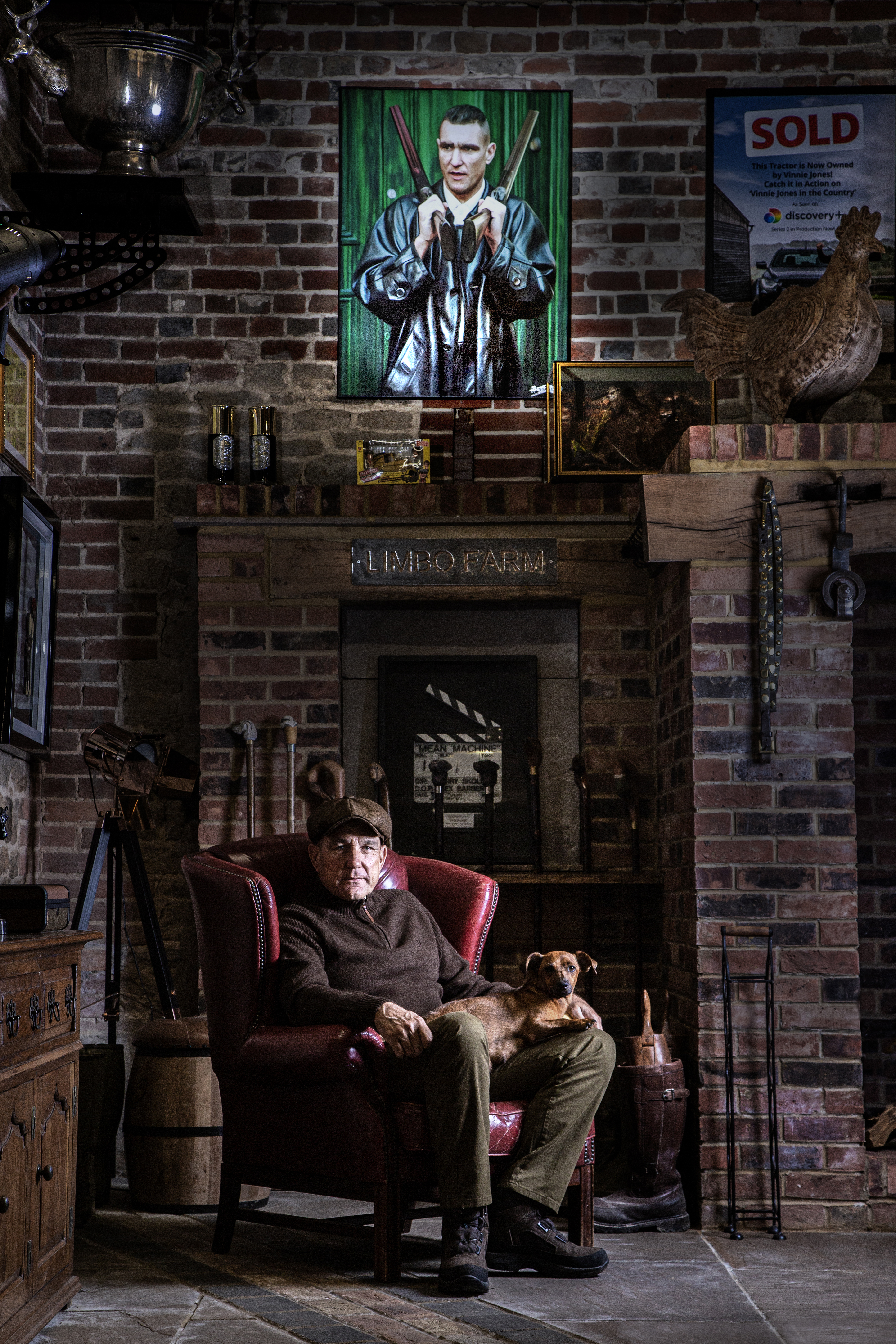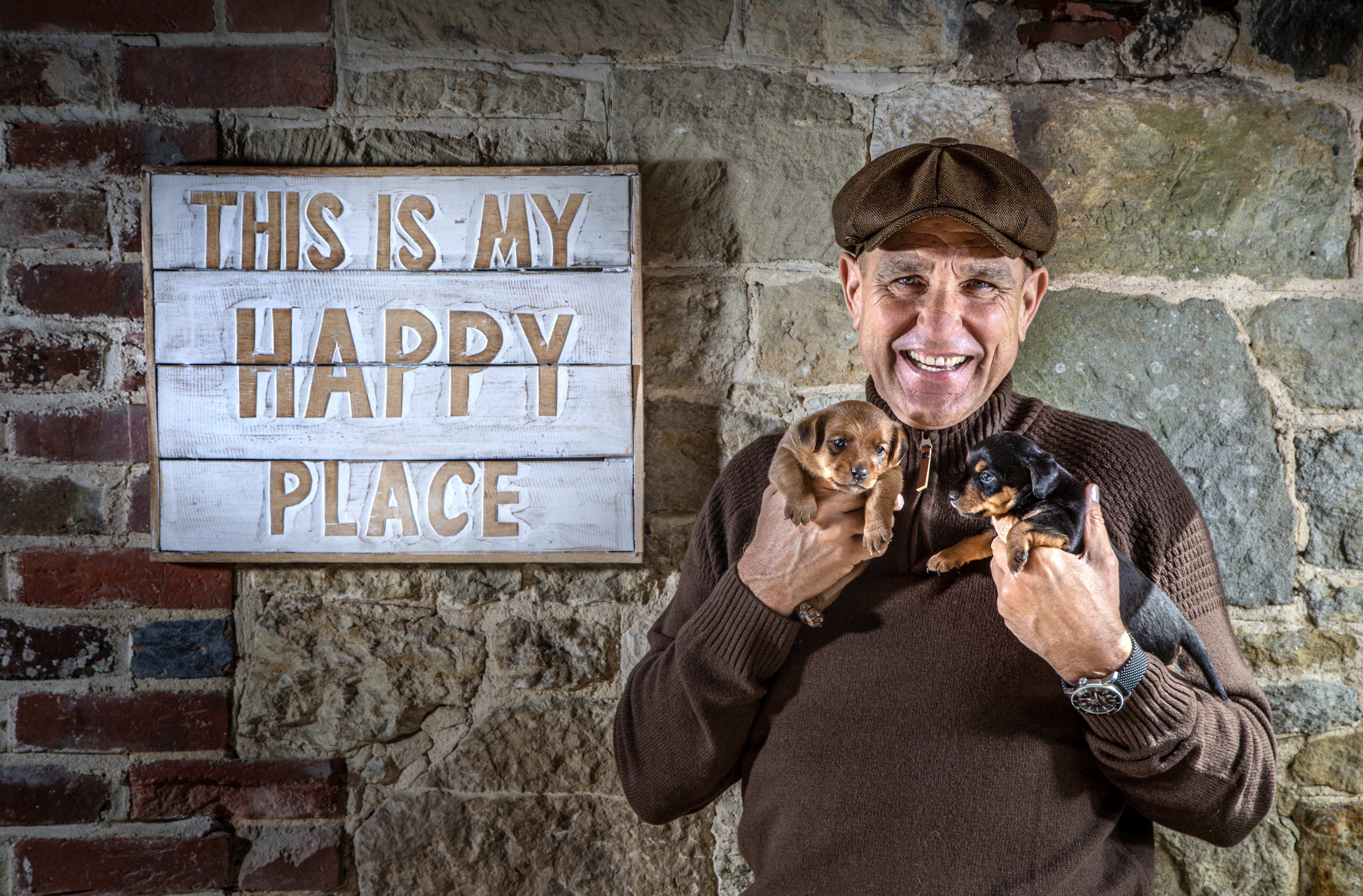‘My football made me, my countryside saved me’: Vinnie Jones on going from the rough and tumble of the football pitch to the sanctuary of his West Sussex estate
A return to the land has been a redemptive journey for the gamekeeper’s son and former tough midfielder Vinnie Jones, finds Mary Skipwith.

There is something endearingly incongruous about the so-called ‘hard man’ of football and Hollywood, Vinnie Jones, snuggling two puppies to his chest as he poses for photographs. He reassures Pip, the pups’ mother, who barely leaves his side all day, snoozing on his lap one moment and riding shotgun in his Polaris the next. Jones has learnt to share his space with her, including the limelight. ‘I was in the Post Office recently when an old lady said: “I know you, don’t I? You’ve got that little dog, Pip, on that show.”’
‘That show’ is Vinnie Jones in the Country, the Discovery+ series that documents life on Jones’s 2,000-acre West Sussex estate, half of which is leased and the other he owns. He and his partner, Emma Ford, have a passion for renovating old buildings. Budgets are often blown, but the couple accepts that, ‘because it’s the life we want to protect. We don’t want it to be massive, we just want it to be our home’.
This understated approach is noticeable elsewhere. Smart cars do grace the drive, but it’s the Polaris towards which Jones gravitates. ‘I even drive it to my barber,’ he says. No compliment can be forthcoming, as his hair is hidden under a Crow and Jester baker-boy cap, one of 40 he owns, the result of a boyhood obsession with hats. He had the company create his perfect cap — which took a year to meet his exacting standard — and he is rarely seen without one. Although, he concedes: ‘I gave in to Emma and don’t wear a hat to dinner now.’

Football boots have been replaced by his favourite outdoor ones from Härkila, a brand he dresses in head to toe almost daily: ‘My manager begs me to wear something other than brown or green moleskins and sweaters with an H on them. It makes everyone laugh that I’ll dress to work on the farm, then when I leave for filming The Gentlemen later in the day I’m in the same kit.’ In the Netflix series, Jones’s role as a gamekeeper is fitting, as his father was one and it was the life he hoped for. ‘You never imagine you are going to make it as a footballer,’ he admits. ‘That was the dream, but I thought my reality was to be a gamekeeper.’
Born in Watford, Hertfordshire, an early memory is of Jack Russells fighting in a house full of rods and guns. Moving to Bedmond was initially ‘traumatic’ due to leaving the friends he played football with at South Oxhey infant school, where he was already scoring hat-tricks. He credits the football-obsessed headmaster at Bedmond Junior School and the simultaneous awakening of his interest in the countryside for healing that wound.
Surrounded by fields, Jones began to embrace his new lifestyle. Journeys to school were in a Land Rover, with a jackdaw he had tamed flying behind and perching on his shoulder at collection time. ‘My friend Mark and I would camp, go out with air rifles, catapults… you name it, we did it. Everywhere was alive with rabbits and we’d be out ferreting night and day. That or fishing. There were old gravel pits nearby, so we’d catch fish in the canal and take them there as if it was our own lake. We’d go on a Friday and come back Sunday evening. We were only 11. You couldn’t do it now, but it was a magnificent way to live.’ Even during his footballing years, his interest in the countryside never waned. When an away fixture at Manchester United included time for shopping, his teammates came back laden with designer clothes, but he appeared clutching camo nets from an army-surplus store.
Despite rubbing shoulders with myriad celebrities, Jones still values childhood friendships. ‘I was filming in Iceland when a guy said there was fly-fishing available so I flew Mark out and we had a fantastic time,’ he recalls. ‘I am in a privileged position where I can take my old friends to do these things. Guy [Ritchie] is like a brother and I have other famous friends, but if you went through my phone you’d find it’s full of Watford mates.’
Exquisite houses, the beauty of Nature, and how to get the most from your life, straight to your inbox.
We might imagine fortune has allowed Jones to enjoy all the sport he’d like on his estate, but he admits that, despite fulfilling his wish to own a trout lake, the only thing he attracts on his fishing rod is dust. The same goes for shooting: ‘I still receive invitations, but I doubt I’ve pulled a trigger here for five years. I’m content to swap a rod and gun for a dog and stick. For me, it’s about the camaraderie and talking about what’s happening in the land.’ The topic that gets him most animated is meddling in rural matters by those who don’t know the countryside. ‘Why can’t they understand why the deer population needs controlling?’ he asks. ‘Why are subsidies for schemes that have been proven to improve wildlife populations being pulled? It infuriates me that we’re told, “You shouldn’t do this, you can’t do that” — but then they cut back on help.’

Help is something Jones is passionate about giving. From auctioning his Land Rover 110 for charity to supporting local events, he uses his voice for others’ benefit. Attuned to the isolation that accompanies many rural jobs, he champions supporting mental health and is a patron of the National Gamekeepers’ Organisation. ‘The Game Fair was the original rural internet where country folk exchanged ideas,’ he says. ‘We’ve lost opportunities with pubs closing and meetings moving online.’ He hosts breakfasts so farmers can socialise and uses the platform of Vinnie Jones in the Country to encourage people to open up. Watching someone of his reputation showing vulnerability has resonated with viewers: ‘A guy came to my gate recently to tell me I’d saved his life. He had been watching an episode where I had been talking about how to keep going through tough times. I believe the real way to man up is to talk about the hard stuff.’
Grief is something Jones has endured first hand, having lost his wife, Tanya, to cancer in 2019. His hope is that he can show those struggling how to be strong. ‘We all have a different journey, but grief is roughly the same colour. I hope that with what I’ve been through and the joy I am going through now, I can help.’ He also applied his ‘head down and swing like mad’ mantra when giving up alcohol 12 years ago. Reflecting on the struggle, he advises: ‘You’ve got to commit. Do it on a Monday. It’s not a cliché when everyone who has done it says: “I wish I’d done it before.” You never hear anyone regret giving up booze.’
When analysing the root of the problem, Mr Jones is disarmingly honest. ‘When I was playing football, my ego — which I call my dog — was in charge. I had to learn to control it, then make friends with it. I am in charge of it now, but would I ever turn my back on it? No. With alcohol, it lets me down and then I let everyone down. We all need humbling and losing Tan did that for me. I’ve got a fantastic partner now and a wonderful life, but I wouldn’t have if I hadn’t got the dog under control.’
As Pip stirs next to him, hopeful of imminent adventure, he adds: ‘Football isn’t the core of who I am. Yes, beating Liverpool in 1988 is as immense now for me as it was then. But I put all my energy into my football career and being Vinnie Jones was a heavy weight to carry. The countryside was my solace. When I retired from the game, the anxieties went with it. My football made me, my countryside saved me.’
Perhaps it’s fair to say he was a mad dog in his younger years. Or perhaps his bark was always worse than his bite. However, it seems that, now, Jones is actually a pussycat.

Guest Editor Sir David Beckham on Vinnie Jones
Vinnie Jones is a real character and a special person. When I was playing, he was one of those footballers you did not want to go near on the pitch because he’d either grab you, throw you or kick you. Back then, that was his thing and he made a successful career before becoming a pundit, when he did criticise me. I didn’t think he liked me; but, when I met him later at Guy’s place, we didn’t stop talking. He bought me a walking stick he’d made for me and he’s now a great friend, who, like me, has found solace in the country later in life.
This feature originally appeared in the October 22, 2025 issue of Country Life. Click here for more information on how to subscribe.